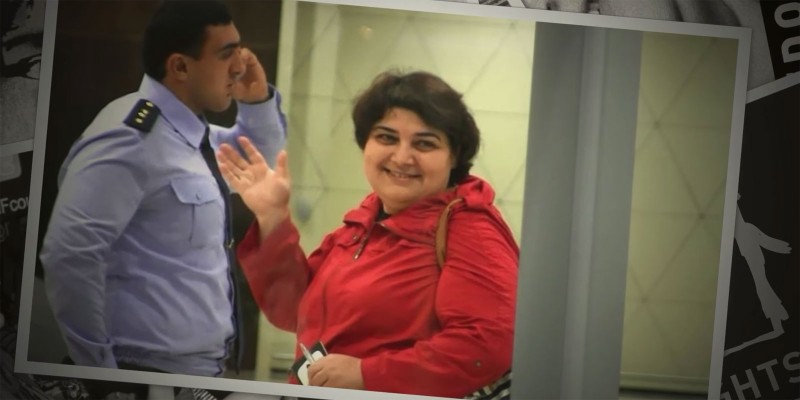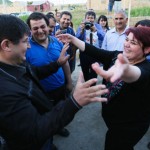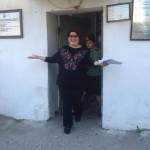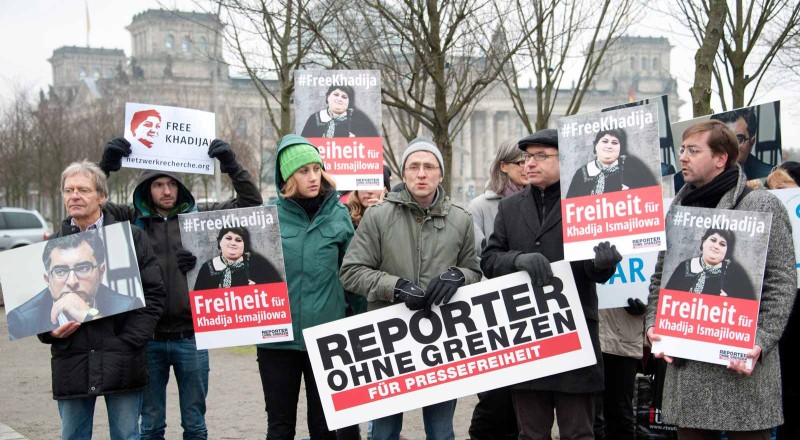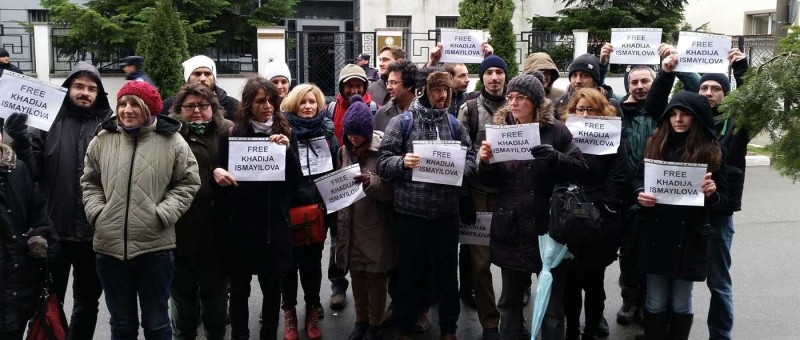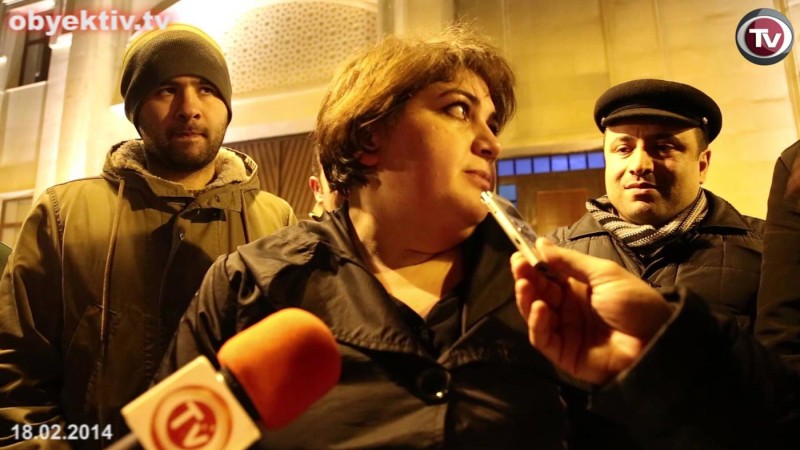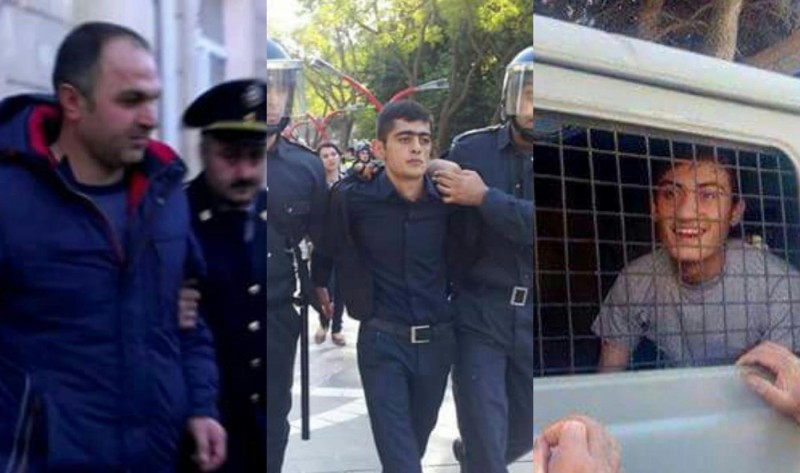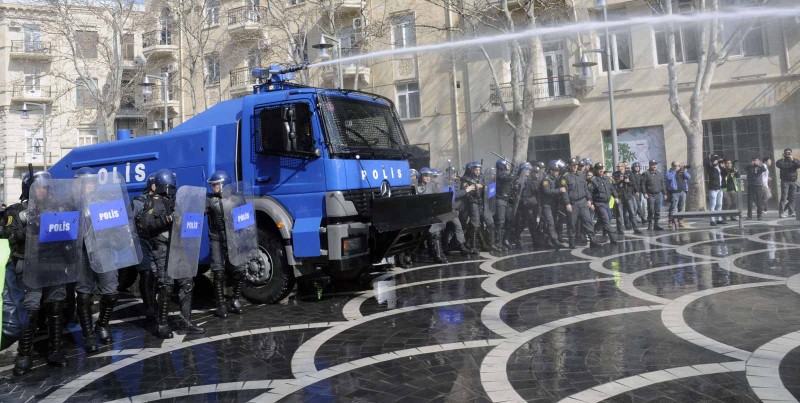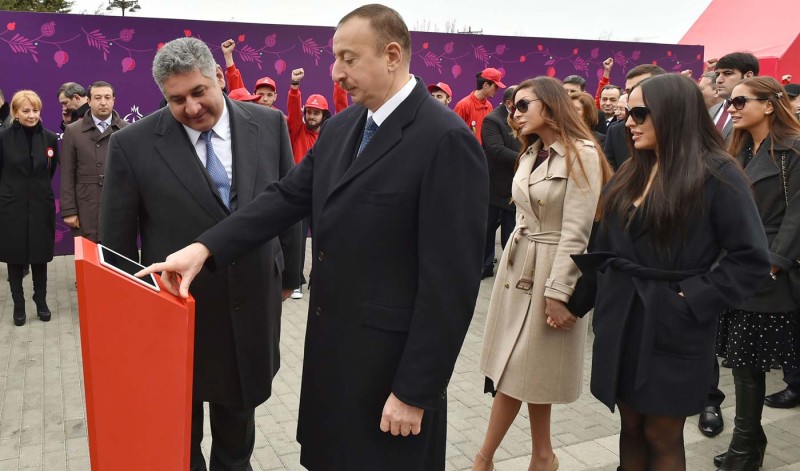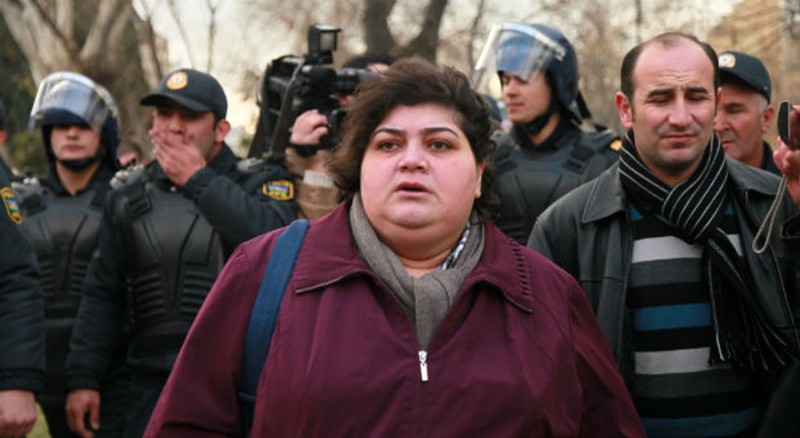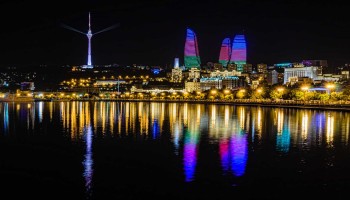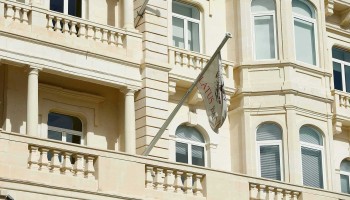Khadija Ismayilova knew she didn’t have to go to prison. But in her mind, her only other option was to exile herself from her native Azerbaijan.
Over the past decade, the investigative reporter and commentator for Radio Free Europe/Radio Liberty (RFE/RL) and regional coordinator and partner for the Organized Crime and Corruption Reporting Project (OCCRP), had been shaking things up by exposing government corruption.
More recently, she was zeroing in on the activities of President Ilham Aliyev and his friends and relatives. She has said that she never set out to target them; their names just kept cropping up in her investigations.
Along the way, she started getting clear warnings —warnings other journalists might have heeded. Ismayilova knew that they were telling her to keep her nose out of places it didn’t belong.
But for her, running wasn’t an option.
So after returning from another of her frequent foreign trips — trips in which she spread the word about the crackdown on journalism and human rights in her country — she plunged back into her investigative reporting.
The more she dug, the clearer the picture became. Her investigations documented the outright plundering of the Azerbaijani treasury. She was uncovering a major league money grab. Based on her ongoing investigations, the First Family and its cronies seemed to be leveraging personal control of the former Soviet state’s transportation system, banks, government mining operations and more.
The more she uncovered and reported, the more the government tried to close off the access to key information. When that didn’t stop Ismayilova, the threats of personal attacks began — outrageous, demeaning and humiliating attacks.
Ismayilova told them she wouldn’t stop, so they followed through by releasing hidden camera video of her most intimate moments.
The ploy backfired, however, and turned public sentiment in her favor, she said.
Next they arrested her on what her employers, supporters and leading journalism organizations consider to be ludicrous, trumped-up charges.
Death of an Investigative Journalist
Nearly a decade earlier, it had been the assassination of another journalist that awakened the then-28-year-old reporter and inspired her to devote her life to exposing corruption, consequences be damned.
“My colleague, Elmar Huseynov, he was killed,” Ismayilova said. “He used to publish a very critical and independent magazine, ‘Monitor,’ which highlighted high-level corruption cases and the President’s family being involved in corrupt practices.
“So he was killed at his own doorstep.”
Ismayilova admits that, up until that time, she had been critical of Huseynov’s work. She says his stories were not balanced and he rarely verified what he was publishing as fact.
“I was so snobbish about what he was doing,” she said, “because I was coming from this high standard journalism — English language journalism. Sometimes his stories were not well done in terms of standard American journalism.”
But on Wednesday, March 2, 2005, she says she came home, switched on the television and watched a flash news report.
Someone had shot and killed Huseynov.
“At that moment, I remember it changed everything in my mind,” she said. “I was shocked. I didn’t know what to do.
“That was the moment when I felt guilty. I started crying — I just couldn’t control it. I couldn’t stop crying.
“I felt responsible. I felt it’s my fault as well. We killed him.
“He was a great journalist — very brave,” she said. “He was the only one who was doing this brave journalism.”
She says she realized that, unlike the kind of work she had been doing, Huseynov had been working on topics that were much more difficult to report. He had tried his best to get all of the key documents to prove his stories, but often failed, she said. Ismayilova now realized that the proof was not that easy to get.
“But he was telling the truth to people,” she said, “which I didn’t do because it was too difficult to do.”
Ismayilova Picks up the Torch
That’s when she says she vowed to help pick up where Huseynov had left off, to raise the standards of journalism and to learn better ways of documenting the corruption.
She found that help, in part, through OCCRP. Editor Drew Sullivan says Ismayilova attended just about every training session the international investigative reporting consortium offered.
“She was working for the English-speaking Caspian Business Daily,” Sullivan says, “and I was impressed. She was at ease working with documents and records, and she was able to understand complex business deals.”
Sullivan says he came to notice how tremendously motivated she was.
“It wasn’t long before I knew we had to bring her on board,” he said, “and she’s been a thorn in the side of Azerbaijan’s First Family ever since.”
Until 2009, Ismayilova says, the media were still very quiet in Azerbaijan because of continued attacks on reporters who were writing critical stories. But that year, she says, she began helping Washington Post writer Andrew Higgins work on a story about the president’s children owning expensive real estate properties in Dubai.
“When this story was published and it came from the Washington Post, we started discussing it, and it stopped the silence — it broke the silence,” she said. And, she said, nobody denied that the children owned the property.
“Before that, we had journalists saying, ‘Oh, this government, president — they are thieves.’ It was all their own opinions — never facts. And now we had facts to talk about — facts to refer to.”
A newspaper from the United States had done what local journalists had not. “And then I thought, why is it that a Washington Post correspondent is doing that, and we cannot?” she said.
A New Kind of Reporting for Azerbaijan
This kind of reporting was unprecedented in Azerbaijan, she said. She and her fellow reporters learned from OCCRP how to fish for offshore companies connected to the Aliyev family.
Right away, they reeled in a big one of their own.
Ismayilova and her colleagues started digging into bank privatization records relating to the state airline company. They discovered that, in the mix of privatization, one of the president’s daughters ended up being one of the owners of a bank. As private citizens, they could receive money and properties that otherwise would be illegal for the President, himself, to receive.
In August, 2010, Ismayilova and fellow reporter Ulviyye Asadzade broke the story.
“They broke the law to become a bank owner,” Ismayilova said. “We published this story, proving every sentence there.”
Indeed, they proved that Arzu Aliyeva, the president’s daughter, was one of the owners of Silk Way Bank.
The bank was part of a larger, recently privatized company that enjoyed a near-complete monopoly over every aspect of airline service businesses including the airline catering company, the airport taxi service and even the job of maintaining the planes and helicopters.
It wouldn’t be the last time Ismayilova would follow the money and find one or both of the president’s daughters at the other end of the trail.
“It’s not that I’m chasing them,” she said. “No, I’m not chasing them. It’s just that, wherever I dig, they pop out of the documents — their names pop out of them.”
There was no comment from the government about Arzu Aliyeva’s interest in Silk Way Bank. However, the Aliyev regime began trying to silence the voices that weren’t under its control.
A Dark History for Independent Media
For nearly a century, the Azeri people had little or no access to news stories that were critical of the government. From 1920 until 1991, this Eurasian country on the Caspian Sea just north of Iran and east of Turkey, Georgia and Armenia was part of the Soviet Union. And in the USSR, Ismayilova says, there was no real journalism.
“There was propaganda,” she said. “The journalism books in Soviet times would say, Journalist should express his own opinion, which is based on the state’s interest.”
Since 1991, when Azerbaijan gained its independence, journalism has not improved much, Ismayilova said.
The government fully controls the broadcast media, she said, and the handful of newspapers have low circulation and poor distribution. The newspapers, she said, belong to opposition parties, and they spread party propaganda.
“So basically, there is no independent media in Azerbaijan,” Ismayilova said. “Most of it is still propaganda, but it’s propaganda of the regime.”
Ilham Aliyev became president on October 15, 2003, two months before the death of his predecessor Heydar Aliyev -- the first time in the former Soviet Union that top leadership passed from father to son.
Heydar Aliyev had been in a leadership role in Azerbaijan for decades. He had been a high-level official in the Soviet KGB and had worked his way up to powerful positions in the Soviet Politburo.
In 1969, Soviet Premier Leonid Brezhnev appointed the senior Aliyev to the post of First Secretary of the Central Committee of Azerbaijan Communist Party, as an enforcer in a Soviet anti-corruption campaign.
Two decades later, Mikhail Gorbachev forced Heydar Aliyev to resign from a high-level position in the Soviet Politburo because of allegations of corruption.
The elder Aliyev became the president of the Azerbaijan Republic in 1993, following the overthrow of Abulfaz Elchibey, its first president. Aliyev won reelection in 1998, despite allegations of voter fraud and corruption.
Before his death in 2003, he had already put his son, Ilham, in a position that would ensure he would succeed him. And just to make sure, according to international observers, the Aliyev campaign strategies included voter intimidation, an infusion of government resources, the banning of local election observers and numerous irregularities in the counting and tabulation of the votes.
Ilham Aliyev garnered 76.84 percent of the votes. He won a second term in 2008 with 87 percent of the vote, thanks in part to the opposition parties boycotting the election.
Silencing the Independent Voices
The following year (2009), was when Ismayilov’s newly honed digging skills helped the Washington Post produce the kind of investigative reporting that could jeopardize the power base built by the Aliyevs.
However, in a one-two punch that same year, the administration countered by orchestrating a constitutional referendum that abolished term limits for the president and inflicted severe restrictions on freedom of the press.
“We had BBC, Voice of America and Radio Free Europe/Radio Liberty,” Ismayilova said, “but they all were banned on local frequencies in 2009. The government of Azerbaijan doesn’t want its citizens to listen to this news, because they were not able to control the content.”
Down, but not out, the foreign broadcasters turned more to the Internet to reach the people of Azerbaijan, although much of the population had no online access.
The daughters played a prominent role in a story again in June 2011, when Ismayilova proved that they were the main shareholders of Azerfon, then Azerbaijan’s only provider of 3G mobile phone services. A few years earlier, everyone had believed what the government had announced — that Azerfon belonged to the German firm Siemens A.G. and a couple of British firms.
“The government was lying about ownership of this company,” Ismayilova said. “It turned out it’s not German Siemens — it’s the president’s daughters.”
In early 2011, Ismayilova was digging through documents involving the privatization of energy companies when she discovered that one of the corporations was involved in a controversial construction contract the president referred to as a “patriotic project.”
“It was building the highest flagpole in the world,” Ismayilova said. “The Azerbaijani flag would be on it.”
But it turned out to be a short-lived glory.
“It was the tallest flagpole in the world for six months only,” she said. “Then Tajikistan built a taller one — another stupid country that wastes money on these kinds of things.”
Ismayilova says she discussed the project on her radio program, and later she would learn from WikiLeaks documents that the country’s leader was not happy with her.
“President Aliyev named me an enemy of the state for making fun of this project on the air,” she said.
Ismayilova Infuriates the Azerbaijani Elite
She says she was still investigating the story on March 7, 2011, when she received what clearly was meant to be a blackmail letter. She had no doubt that it came from someone in the Azeri government.
“I received this package which contained a note saying, ‘You whore. Behave or you will be defamed.’”
It included photographs that Ismayilova could tell were still images that came from a video camera.
“It was hidden camera footage from my bedroom where me and my boyfriend were engaged in sexual relations,” she said.
This had happened to other journalists, she said. One was a man who had been having sex outside his marriage. That video showed up on the primetime news of a station she says the president’s cousin was running. Another video was of a reporter from the same newspaper caught on hidden camera masturbating in his hotel room. She says one of the journalists quit his job and disappeared. The other resigned from his job with an opposition newspaper, she said, and now only writes about literature.
“I knew that this is how they want to stop me,” Ismayilova said.
When she thought about it, she says she realized that neither of those other reporters had fought back when someone had threatened them. If they had, she said, this might not have happened to her.
“I decided that it’s probably my responsibility to make sure that it will not happen to others.”
She ignored the advice of colleagues who told her not to do her radio show that afternoon.
“I ran my show and I’m sure they were listening to me that day,” she said. “Those who were blackmailing me.”
Next, she posted a public statement on Facebook under the headline: “This is how I answer the blackmailers.”
“I said I’m not going to stop any of my investigations and I said I’m not going to shut up. I’m not ashamed of anything in my life, I’m not ashamed of anything I’ve been doing, and if they think that they shamed me — and that will stop me — they’re wrong.”
She says she filed a complaint with the prosecutor’s office, but it didn’t stop the blackmailers from posting the video of her and her boyfriend on a website that the blackmailers had created to look like it belonged to an opposition party.
To her astonishment and relief, Ismayilova says the blackmail attempt was a failure — instead of people condemning her, they rallied behind her.
“In a country where honor killings are still taking place, in a country where women are not entitled to have sex before marriage, in a country where this kind of behavior, like having a boyfriend, having an apartment and living by yourself, is considered as going against traditions,” she said, “I received full support from society.”
She says it didn’t surprise her that the prosecutor’s office said it was never able to identify who had put the secret video cameras in her apartment.
“I had no doubts about who did it — who ordered it —but I wanted to know how did it happen.”
Investigating – and Solving – Her Own Case
Ismayilova says she was able to figure out the camera angle and quickly discovered phone wires where the camera in her bedroom had been. She followed the wires to the living room and also to the bathroom.
“That was a shock,” she said. “And the week after, I couldn’t go to the bathroom. I had this feeling that somebody is watching.”
She followed the wires from inside the apartment to a telephone box outside that belonged to the state-run telephone company. She demanded that the prosecutor’s office call whoever installed the line so that person could explain the purpose of the phone line.
“They didn’t do it,” she said, “so I called one myself. I just called to the telephone company to send a serviceman.”
She says that the man who arrived looked at it and said he remembered installing it. He recalled bringing the line to the outside of the apartment back in July of 2011 because the client needed another phone line — at least that’s what his work order had led him to believe.
“There was someone in my apartment who asked him to leave an extra 15 meters of wire, but not to enter the apartment because someone else will install it further.”
Ismayilova says she asked the prosecutors to document what the installer had told her, but still nothing has come of the investigation.
In the meantime, she continued working on the investigative stories she had been pursuing when the blackmail attempt occurred.
She had teamed up with her former student, Nushabe Fatullayeva, who had been doing some curious digging of her own.
They struck gold: On May 2, 2012, the two journalists documented a paper trail that proved that a lucrative contract to mine government gold had gone to a company in the United Kingdom — a company that was actually owned by a Panama corporation. Ismayilova and Fatullayeva showed that Leyla and Arzu Aliyeva were the secret owners.
Six days later, Ismayilova found even more family financial ties. This time, it involved the building of a US$134 million concert venue called the Crystal Hall to host and showcase the 2012 Eurovision Song Contest in Baku.
One of the builders of the 23,000-capacity facility, Ismayilova discovered, was a company of which the president's daughters and his wife were secret owners.
Following the Money Abroad
That same year, Azerbaijan’s National Assembly passed legislation that required a court order to find out who owns what in Azerbaijan, and, just to be safe, the law grants lifelong criminal immunity to all ex-Presidents and ex-First Ladies.
The new laws only apply to companies in Azerbaijan, so Ismayilova and OCCRP colleagues Pavla Holcova and Jaromir Hason dug through property records in the Aliyevs' favorite travel destination, the Czech Republic. In October of 2011, the team reported that Azerbaijani officials, including members of the Aliyev ruling family, had formed corporations in Prague, purchased land, and built hotels and villas in luxurious places such as the famous spa city of Karlovy Vary.
In that case, presidential daughter Arzu Aliyeva’s name showed up on the key documents, as did the president’s father-in-law, Arif Pashayev. He’s the wealthy patriarch of what’s considered to be Azerbaijan’s richest and most influential family. Pasha Holdings is connected to numerous hefty government contracts in several major industries.
By the time the next presidential election rolled around in 2013, the government was cracking down on journalists as well as any activists who dared to speak out publicly. Authorities even jailed neutral election monitors. Aliyev received 85 percent of the vote and breezed into his third term.
Amnesty International criticized the Aliyev government for what it called “election irregularities.” The watchdog group Transparency International listed Azerbaijan as having one of the most corrupt governments in Europe.

Ismayilova broke another corruption story in late June 2014, when she wrote about media mogul Sona Veliyeva, who is married to Ali Hasanov, an influential government official — an official with power to make policy regarding freedom of speech, political liberties and the media.
Quite often, Ismayilova wrote, President Aliyev would make decrees that prevented outside networks or productions from airing video inside Azerbaijan. To fill the video vacuum, Hasanov would dole out contracts to local producers, including the companies his own wife owned. In all, Ismayilova connected a dozen such media companies to Hasanov’s wife.
Less than a month later, Ismayilova followed up on her earlier story about the president’s daughters owning shares in one of the mobile phone companies. She proved that Leyla and Arzu Aliyeva were working their way toward a near monopoly of the telecom industry by acquiring a big piece of the other major cell phone carrier in Azerbaijan.
The story promised even more details to follow. Before she could provide them, authorities arrested Ismayilova on Dec.5, 2014. She’s been in prison since.
But jailing the reporter won’t stop the reporting, said OCCRP’s Sullivan. Khadija was working on many stories when they arrested her, and journalists from four continents are picking up where she left off.
“They’ve been terrorizing journalists for too long, including one of our own,” said Sullivan. “They may have arrested Khadija, but we’ve gotten twenty to take her place. And by the time we’re done it could be more than one hundred international journalists who will continue her work.”
“We’re in this for the long run.”

